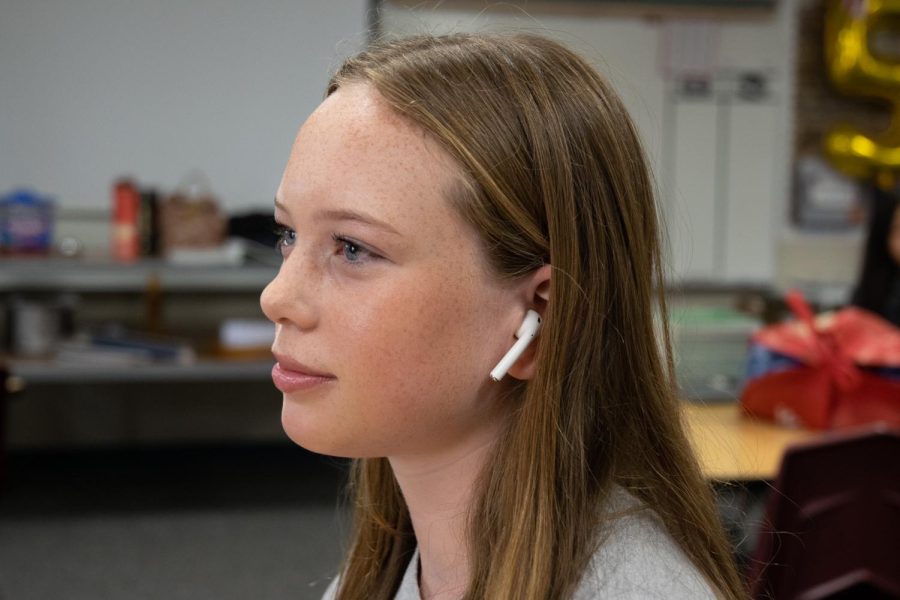Should AirPods be allowed in class? Why or why not?
There has been an increase in the number of students using AirPods in class, but teachers believe they provide an opportunity for cheating.
May 24, 2023
Have you ever seen someone using AirPods in class? Have you ever used AirPods in class? Although they’re generally not allowed, many students argue that they should be. Can the privilege of this technology be connected to academic growth or linked to the downfall of the grades? So, what are some of these reasons?
Let’s start with a well-known fact: students of all ages have shown higher scores and grades while listening to music as they study. Listening to music while learning helps students focus, which has shown to increase their understanding of certain subjects.
According to Glean.com, “A study from the Stanford University School of Medicine found that classical music helps your brain to not only learn new material more easily, but also interpret it too. The same study found that music can train you to pay closer attention to events and get better at predicting outcomes.”
Students across grade levels have shown to benefit from music while studying which increased work efficiency and productivity.
“Using AirPods during class would help people be more productive and concentrate on their work. I like to listen to music while I study or do homework because it helps me focus,” says Umi S.
Not only can listening to music with your AirPods help with concentration on assignments but it also makes school a more engaging environment.
“Sometimes when I’m at school, I’ll be in a really annoyed mood, or I just want to be left alone, but I feel like whenever I listen to music, all of those feelings kind of go away. After the song is over, I feel kind of regenerated and refreshed. I think a lot of other people are like that too, since being able to listen to music makes students happier, especially if they get to personalize [according to] their own tastes,” says Montgomery D.
Enjoying music can also help boost the listener’s mood, and can make school a more engaging environment.
According to Pfizer.com, “Listening to music increases blood flow to brain regions that generate and control emotions. The limbic system, which is involved in processing emotions and controlling memory, ‘lights’ up when our ears perceive music. The chills you feel when you hear a particularly moving piece of music may be the result of dopamine, a neurotransmitter that triggers sensations of pleasure and well-being.”
AirPods also have a noise canceling feature, which allows students who have auditory processing difficulties feel more at ease, giving them a greater ability to focus on what they’re doing in class.
“[Students with] sensory sensitivity may need to use AirPods, since they can lower background noise, and the class environment can be distracting and overwhelming, and maybe listening to calming music or just blocking out the noise can help with that,” says Alyssa P.
Students who are sensitive to a loud classroom buzz can benefit from using AirPods in class to cancel out distractions and to help with sensory overloads.
But, what are some of the reasons why AirPods aren’t allowed in school?
They can be a distraction from the class instruction and can diminish a student’s understanding of the material being taught.
“I think it could be a big [interference] from what’s actually going on in the classroom and what they should be working on,” says Mrs. Harris, a seventh-grade Language Arts teacher at Day Creek.
With lyrics blasting in a student’s AirPods, it’s likely they could be sidetracked from their work.
According to AudioTechGadget.com, “School management often clarifies the AirPods ban by citing that these earbuds are the cause of distractions. Students are most likely to listen to shows and music during the lecture and not focus on their studies.”
Students may take the opportunity to communicate with friends in other classes, ignore a teacher’s directions or even cheat on exams.
According to Headphonesty, “By hiding AirPods under hair or a hat, students could easily hear answers fed to them by someone stationed outside the classroom. While this is harmless on its own, the trick does spark some concern for parents and educators who could see this as a method for cheating during exams.”
AirPods connected to a phone call or a recording of the test answers are one of many ways students could use AirPods to cheat, which is why many schools do not allow them on campus.
“[A student] could be on the phone with somebody giving them answers, or they could be listening to [a recording of] all the answers, so I think there [could be] problems with academic integrity,” says Mrs. Harris.
The use of AirPods in class, specifically during tests, opens the door for academic dishonesty, which could result in office intervention, referrals, or even suspension, something avoided by having an overall ban.
While much of the student body believes that AirPods should be allowed in class, teachers and administrators are concerned about how students could be using them. So, do you think AirPods should be allowed in school?








Larry • May 3, 2025 at 3:01 pm
yes
Micah B. • Apr 23, 2025 at 11:16 am
I don’t think they should be allowed during class they would be too much of a distraction.
Anya • Mar 10, 2025 at 8:17 pm
yess
Ian • Mar 3, 2025 at 1:23 pm
yes
Anthony • Feb 27, 2025 at 6:30 pm
yes, but just take them off during a test.
Sai • Feb 20, 2025 at 3:39 pm
ok
Weston • Jan 31, 2025 at 10:09 am
yea
zay • Dec 12, 2024 at 8:18 am
yea